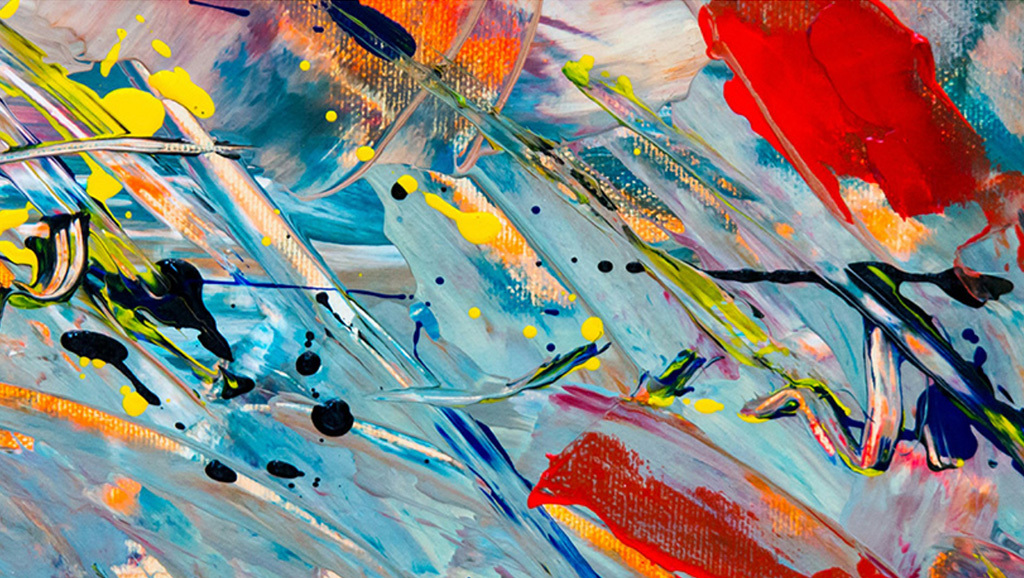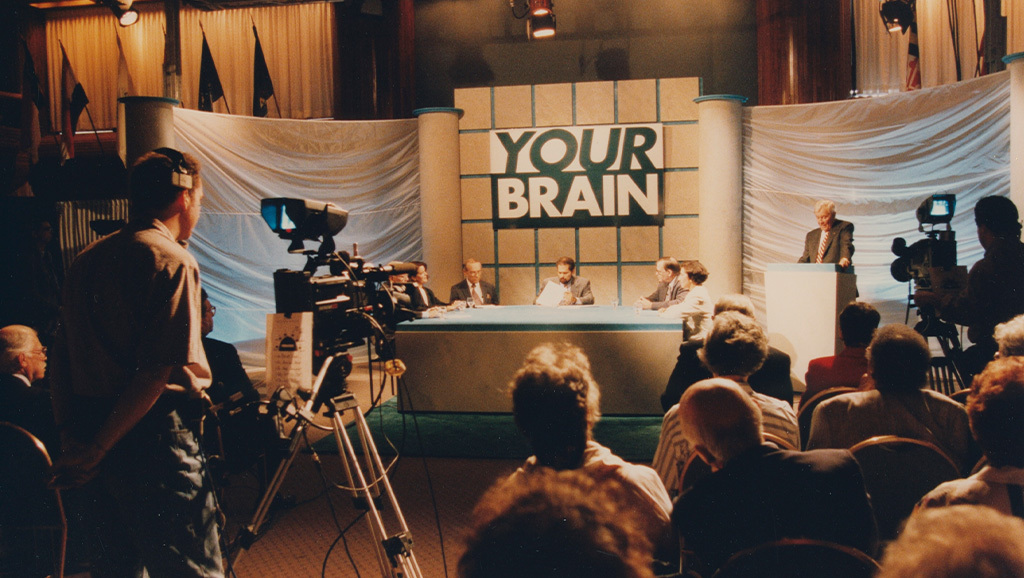News & Insights
Winning Neuroethics Essayists Widen the Conversation
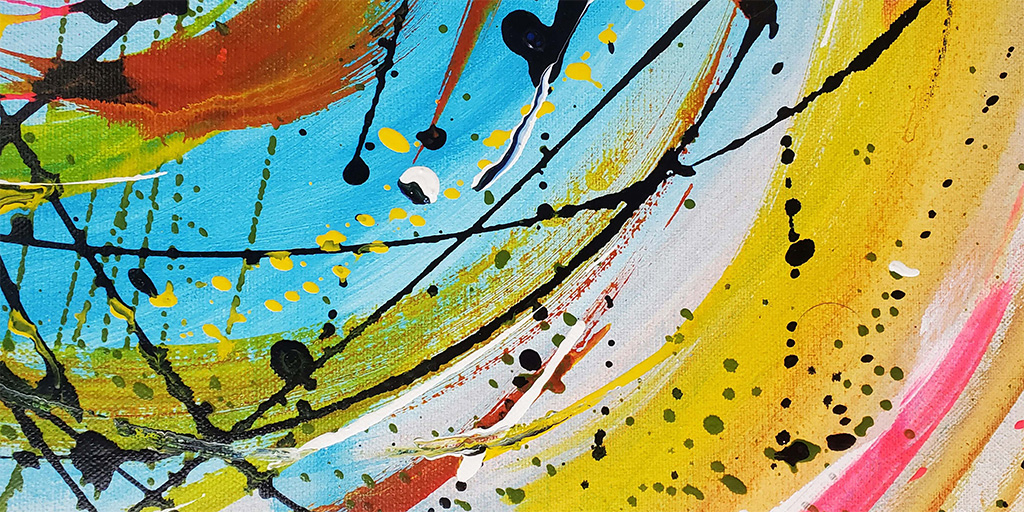
Through its annual Neuroethics Essay Contest, the International Neuroethics Society (INS) fosters interest in neuroethics among students and early-career researchers from around the world. The contest, now in its 11th year, invites participants to submit original essays exploring the myriad relationships between neuroscience, ethics, and society. Winners receive cash prizes, membership in the Society, and an expenses-paid trip to its next annual meeting.
With entry categories spanning high school, undergraduate, graduate, and postdoctoral levels, the competition attracts a diverse array of perspectives. The contest is organized by the members of the Society’s student/postdoc committee and the editors of the International Youth Neuroscience Association (IYNA) Journal. This 2023 contest was sponsored by the Dana Foundation under its Education program. In alignment with the Foundation’s mission and Education program’s goal, the contest not only aims to spark interest and support education in neuroethics among students and trainees but also help inspire the next generation of interdisciplinary experts who will lead efforts to ensure neuroscience’s positive role in the world.
In the following profiles, we introduce you to six up-and-coming people—three winners from the 2023 contest and three from past years—whose thought-provoking and insightful essays are expanding the conversation around the intersections of the mind and brain sciences, ethics, and law.
Kathryn Petrozzo, Ph.D., 2023 Academic Essay Winner
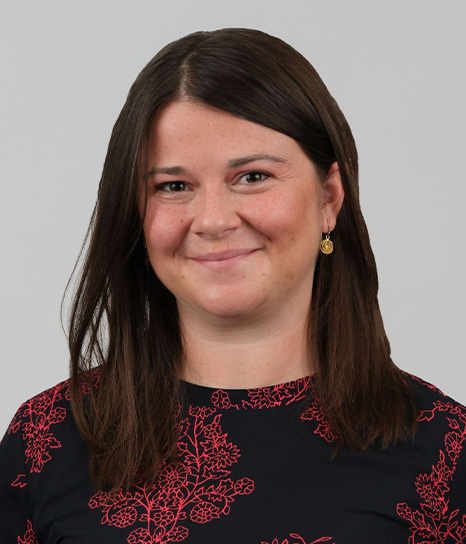

Kathryn Rose Petrozzo
Kathryn Petrozzo will receive her Ph.D. at the University of Utah’s department of philosophy in May; she successfully defended her thesis just last month in March. Her research explores the conceptualization of mental illness, psychiatric care, stigma, and the intersection of mental health with the criminal justice system.
In her dissertation, she analyzes how scholarly explanations of mental illness can lead to stigma in legal settings, such as when people are deemed fully irrational due to their mental health conditions. Her winning essay on a related topic, advance directives in psychiatry for mature pediatric patients, blossomed out of a class in pediatric bioethics she took early in grad school.
Petrozzo’s interest in neuroethics was sparked by both academic pursuits and personal experiences. “I have family members who struggle with mental illnesses,” she said, “and I’ve thought a lot about the way that they’re treated and how they navigate the world.”
She’s looking forward to attending this year’s annual meeting, in Baltimore starting on April 17. “I’m really hoping to stay in this interdisciplinary academic sphere,” she said.


Photo courtesy of Petrozzo
She’d love to continue her research and advocacy in forensic psychiatry and neuroethics, keeping the focus on pressing social issues such as incarceration and the need for better mental health crisis intervention.
About the essay contest, Petrozzo says, “I think people tend to think that the humanities and STEM exist in these separate silos. It’s really encouraging to see this kind of support for interdisciplinary collaboration and perspective, especially in a day and age where funding for humanities is continuing to get slashed.”
Jada Wiggleton-Little, Ph.D., 2023 General Audience Essay Winner
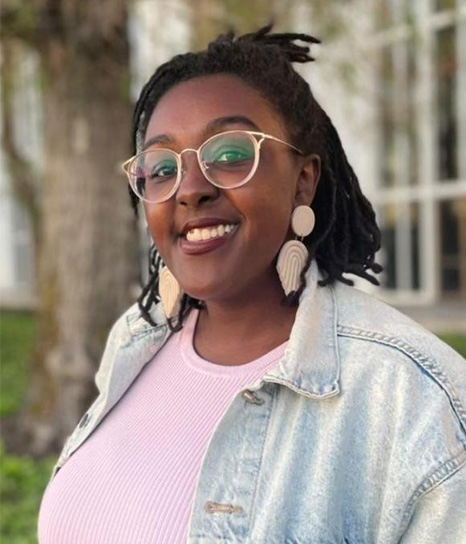

Jada Wiggleton-Little
Jada Wiggleton-Little, Ph.D., a neuroethics fellow at Cleveland Clinic, will be joining Ohio State University as an assistant professor of philosophy this fall. Her work investigates issues at the intersection of philosophy of mind, philosophy of language, bioethics, and race. Her current focus is pain communication. Why do doctors often discount reports of pain if the patient is Black and/or a woman? Would that change if scientists developed an “objective” measure of pain? (Read her winning essay on the topic.)
“When I was a teenager,” she said, “I had unmanaged chronic migraines with aura. At one point in my life, I had migraines every day. I later learned that I was stuck in a pain cycle. However, growing up as an African American woman, I was repeatedly told by others that I didn’t seem like I was in pain. I had a teacher ask my mother if I was just feigning headaches for attention. It wasn’t until I saw a neurologist, who was also an African American woman, that my pain was fully acknowledged. I have never forgotten how she apologized to me for the years that I suffered unnecessarily because I and my pain weren’t believed.”
Wiggleton-Little’s academic interest in neuroethics emerged from an undergraduate background that combined philosophy and neuroscience, aligning with her pre-med studies. “The more research I did on pain disparities and chronic pain management, I discovered that the people most interested in questions about pain, language, and technology were in the world of neuroethics. So, here I am!”
Writing her winning essay was a great exercise, she said. “I am grateful for the opportunities that I have had to publish in peer-reviewed academic journals,” she said. “But I entered this contest because I wanted to make sure that I was practicing the skill of writing complex, theoretical issues for a more generalized audience—an audience that could include those without a college education, like my parents or my grandparents.
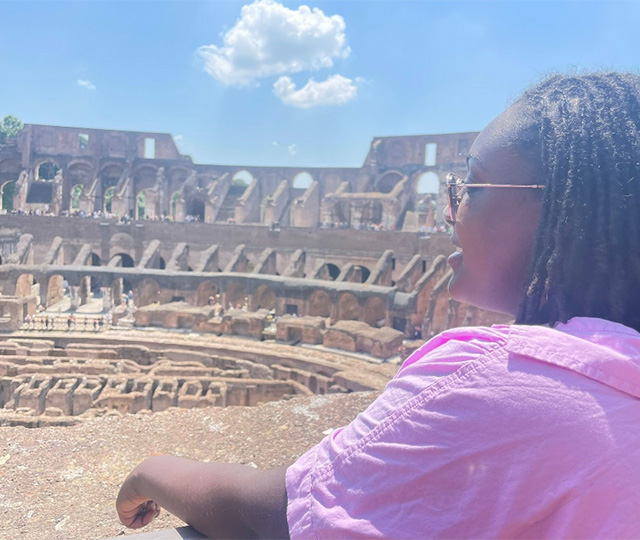

Photo courtesy of Jada Wiggleton-Little
“It was not easy writing this essay! It was hard figuring out the balance between explaining the philosophical concepts and recent advancements in technology without overwhelming the reader with the details.”
Wiggleton-Little is glad for the free trip to the annual meeting this year, too. “I have never been to the annual conference before, and I look forward to further networking with other neuroethicists!”
Abena Amoakowaa Opoku, 2023 High School Essay Winner
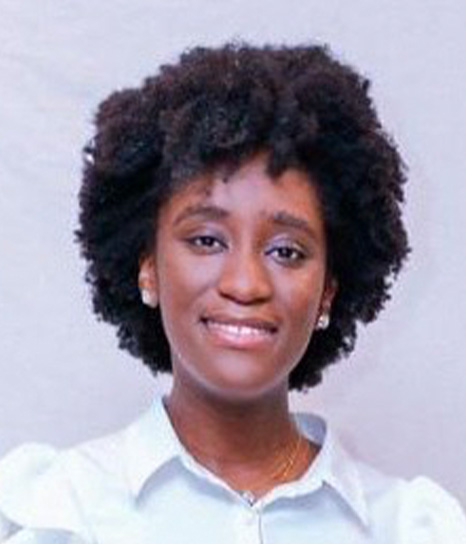

Abena Opoku
Abena Opoku, now a senior at Colonial Forge High School in Virginia, came out of her school’s Covid lockdown period as a sophomore wanting to get as involved as she could with in-person activities. She’s now president of its Science National Honor Society, its TED-Ed Student Talks Club, and its Leo Club for community service. She was doing independent research on neuroscience-related contests for high schoolers when she came across the essay contest.
Opoku’s curiosity in neurotechnology drew her first to researching deep brain stimulation and then to transcranial direct current stimulation (tDCS), a non-invasive neuromodulation technique. Unlike deep brain stimulation, tDCS is accessible and affordable, but not FDA-approved and not regulated at all. In her winning essay, she investigates the ethical implications of the technology.
“It’s DIY,” she said, “You can order it right on eBay or Amazon for around a hundred dollars and have it shipped to your door. You can just hook the electrodes to your head and just, like, go ahead and start.” There’s even a subreddit chat community on the social media platform Reddit with thousands of members sharing their experiences, she said.
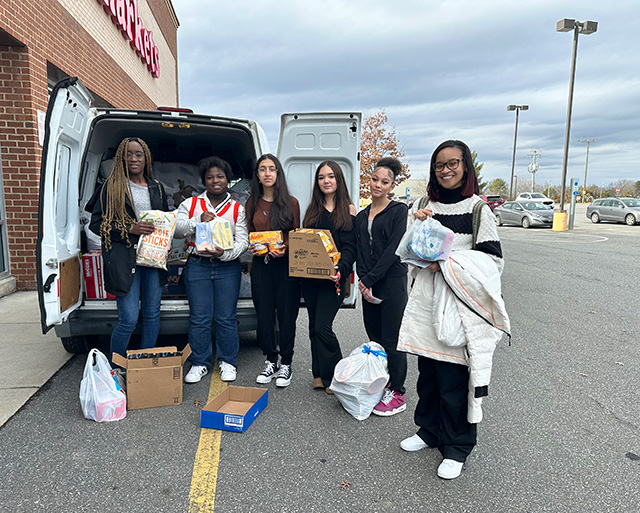

Opoku and peers volunteered with a local food bank for their school’s LEO Club. Photo courtesy of Opoku.
Balancing her interest in neuroscience with an eagerness to address health disparities, Opoku aspires to pursue a career in medicine with a focus on neurology or oncology. She loves to explore the “why” behind scientific phenomena, from the potential uses of brain stimulation to the fact that Black women have higher rates of more aggressive forms of cancer (like triple negative breast cancer) than do non-Black women. She is attending sessions of this year’s annual meeting virtually because she’ll be at Yale attending Bulldog Days at the same time.
Spatika Jayaram, 2022 General Audience Essay Winner
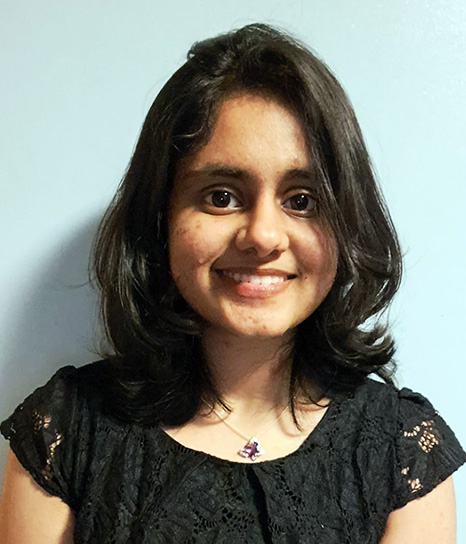

Spatika Jayaram
Spatika Jayaram is a Ph.D. student and Gates scholar at Cambridge University. Her research focuses on the mechanisms of social behaviors and how the brain orchestrates these complex interactions. She wrote her past winning essay on ethical aspects in disorders of consciousness while an undergraduate at the Indian Institute of Science Education and Research, Mohali.
The topic was distant from what she was studying at the time. “I attended the Brain Conference in 2022,” she said, “and I heard Brian Edlow talk about his work in consciousness. The talk was great, and he actually talked about the person’s experiences. So, I wanted to explore more, like what does it really mean when you pick up a signal from a person who is not in ‘a state of consciousness.’ And, it turns out, it can mean both, good and bad.”
In addition to her research, Jayaram loves doing science outreach, aiming to bridge the gap between scientific communities and the general public. She’s participated in Brain Awareness Week, and last year, she worked with the International Youth Neuroscience Association as a content developer for its summer program. She’s also passionate about poetry.
As for the future, she said, “We’ll see. I like my research right now. I like writing and science communication. I like working in outreach, speaking to nonscientists about science because the gap is so large. I’m interested in further exploring the neural mechanisms underlying us as social beings.”
Nathan Luke Higgins, 2021 Academic Essay Winner
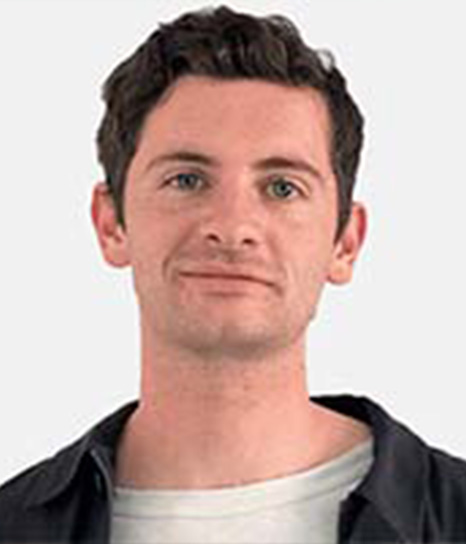

Nathan Higgins
Nathan Luke Higgins is a Ph.D. candidate at Monash University in Australia. His work investigates how people can do research on, improve, and implement neurotechnologies responsibly. His specific emphasis is what happens after experiments using implantable neural devices end: What happens to the devices? How does that affect the people who were wearing them?
In 2021, Higgins used the challenge of the essay contest to flex some newly gained knowledge. “In Australia, you are encouraged to spend the first 6 to 12 months of your Ph.D. immersing yourself in the literature,” he said. “There is no coursework in my program, so this meant I was reading vast quantities of academic literature. I discovered the neglected issue of post-trial responsibility, which has now become the focus of my doctoral thesis. I think with all this reading, I viewed the contest as great motivation to write about this literature I had been consuming.”
With a background in biomedical science, writing this first ethics manuscript was tough. I spent a lot of my time ensuring that I was correctly using and relating neuroethical language,” he said. But his reflective and engaging writing process not only produced an award-winning essay, it also laid the groundwork for his doctoral thesis.
The topic has become a real hot spot of activity in the field, from journal articles and special issues to workshops and seminars dedicated to these questions. “I think I was very fortunate to have written about this topic when I did,” Higgins said. “I enjoyed participating so much I decided to see if there were any opportunities to be more involved in the International Neuroethics Society. I have since been to two of the Society’s annual meetings and am helping run the contest this year!”
Erin Morrow, 2021 General Audience Essay Winner
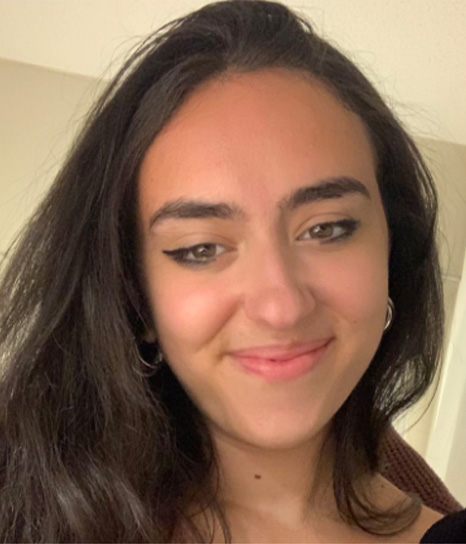

Erin Morrow
Erin Morrow is a Ph.D. student in cognitive neuroscience at the University of California, Los Angeles. Her research investigates how emotion influences the structure and content of human memory, asking questions like: What factors ultimately determine which events endure in our memories? How are these dynamics reflected in the neural landscape? Erin also has strong interests in neuroethics, brain and mental health policy, and science communication.
Her educational path was shaped by her undergraduate program at Emory University. “Some of my professors at Emory—including the wonderful Gillian Hue—had mentioned the essay contest in class and encouraged students to participate,” she said. “I submitted an essay in 2020 and didn’t place, but knew I wanted to try again. In 2021, I became a communications intern for INS and was actually part of the team advertising the contest. A bit unconventional, but once I made sure I was also eligible to submit an essay, it was lot of fun!”
Her winning essay was adapted from a paper she wrote for class. “I had recently read an excellent article by Nadine Liv and Dov Greenbaum about deep fakes and how they could influence our memories of political events and other experiences,” she said. “I wanted to build upon the themes in that article and make them accessible to a general audience—so adapting my class paper for the essay contest seemed like a great way to do that.”
Looking ahead, Morrow aspires to leverage her expertise in cognitive neuroscience within the domain of science policy, particularly in areas affecting brain and mental health. “I see science policy as a promising opportunity to effect real change. It’s easy to write about the impacts of your science in grant applications, but it doesn’t really mean much until it makes it outside of your ‘bubble.’”
Getting her essay published on dana.org and neuroethicssociety.org helped open up new conversations for her at the society’s events and elsewhere. “It’s especially rewarding to get to be a contest judge on the Student/Postdoc Committee, marveling at the caliber of submissions each year,” she said. “I’m so excited when I see more young people getting interested in neuroethics—and speaking so eloquently about it!”
The deadline for submissions to this year’s Neuroethics Essay Contest is July 5, 2024.

